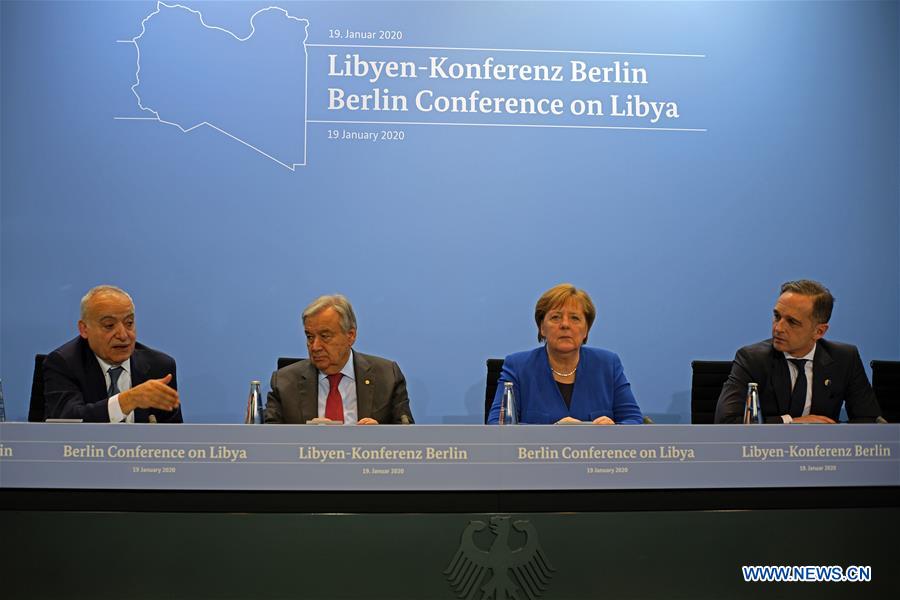
UN Special Envoy to Libya Ghassan Salame, UN Secretary-General Antonio Guterres, German Chancellor Angela Merkel and German Foreign Minister Heiko Maas (from L to R) attend a press conference after the Libya Conference in Berlin, Germany, Jan. 19, 2020. Participants in the Germany-called Libya Conference on Sunday have agreed to respect the arms embargo and truce in the war-torn north African country, pledging to establish an oversight mechanism to ensure long-term peace. (Xinhua/Wang Qing)
BERLIN, Jan. 19 (Xinhua) -- Participants in the Germany-called Libya Conference on Sunday have agreed to respect the arms embargo and truce in the war-torn north African country, pledging to establish an oversight mechanism to ensure long-term peace.
"We had very serious negotiations here," German Chancellor Angela Merkel told the media after the conference. "This conference made an important contribution to driving peace efforts forward."
"All participants agreed that 'we need a political solution'," said Merkel. "In the past few days, it had become clear once again that military intervention was by no means a solution. All participants worked very constructively together."
"We can say that everyone agrees that we want to respect the arms embargo," said Merkel, adding that all participants knew that today they could not solve all the problems in Libya, but that this is the first step.
"I believe that today the spirit has been created that we can move forward on the path. We have agreed on a very binding process," Merkel noted.
The Berlin Conference on Libya will be followed by the first steps to implementing the results. There should soon be a meeting that should lay the foundation for a solid ceasefire, said the German chancellor.
According to the 55-point Conference Conclusions issued after the meeting, all participants agree that "we commit to unequivocally and fully respect and implement the arms embargo established by United Nations Security Council Resolution 1970 (2011) and the Council's subsequent Resolutions, including the proliferation of arms from Libya, and called on all international actors to do the same.
"We call on all actors to refrain from any activities exacerbating the conflict or inconsistent with the UNSC arms embargo or the ceasefire, including the financing of military capabilities or the recruitment of mercenaries," read the paper.
The paper stated that "we commit to efforts strengthening current monitoring mechanisms by the UN and competent national and international authorities, within our capabilities, including maritime, aerial and terrestrial monitoring, and through the provision of additional resources, in particular satellite imagery."
The Conference Conclusions explained that an International Follow-Up Committee (IFC) consisting of all countries and international organizations that participated in Sunday's Berlin Conference on Libya will be established in order to maintain coordination in the aftermath of the conference, under the aegis of the UN.
"I hope the commitments made today will contribute to a lasting solution to the Libya crisis. We need to have a cease-fire. We cannot monitor something that doesn't exist," said UN Secretary-General Antonio Guterres at the press conference.
"It is a strong signal that we are fully committed to supporting a peaceful resolution of Libya crisis....We have a truce," said Guterres, who urged all participants not to do anything that could interfere with this path to a peaceful solution and refrain from interference in the conflict in Libya.
German Foreign Minister Heiko Maas said at the press conference that signature on the conference conclusions alone is not enough, "we must now succeed in bringing the Libyan conflicting parties together and creating the conditions for the civil war to be brought to a political solution."
Libya has been torn by fighting between rival armed factions since 2011. Most recently, troops of Libya's UN-recognized Government of National Accord (GNA) led by Fayez al-Sarraj have been under attack since April from the troops of Khalifa Haftar, commander of the Libyan National Army (LNA).
Al-Sarraj and Haftar were both in Berlin but refused to sit or meet with each other as tensions remained and differences too great between the two sides.
Clashes have killed more than 280 civilians and 2,000 fighters and displaced tens of thousands. The Berlin Conference comes after the inter-Libyan talks held in Moscow on Jan. 13 under the mediation of Russia and Turkey.
High-level representatives of Algeria, China, Egypt, France, Germany, Italy, Russia, Turkey, the Republic of the Congo, United Arab Emirates, Britain, and the United States attended the conference, together with representatives of the UN, the African Union, the European Union, and the League of Arab States.
French President Emmanuel Macron, Turkish President Recep Tayyip Erdogan, Russian President Vladimir Putin, British Prime Minister Boris Johnson, Egyptian President Abdel Fattah al-Sisi and U.S. Secretary of State Mike Pompeo were among the participants.
Yang Jiechi, a member of the Political Bureau of the Communist Party of China (CPC) Central Committee and director of the Office of the Foreign Affairs Commission of the CPC Central Committee, attended the conference as Chinese President Xi Jinping's special representative.